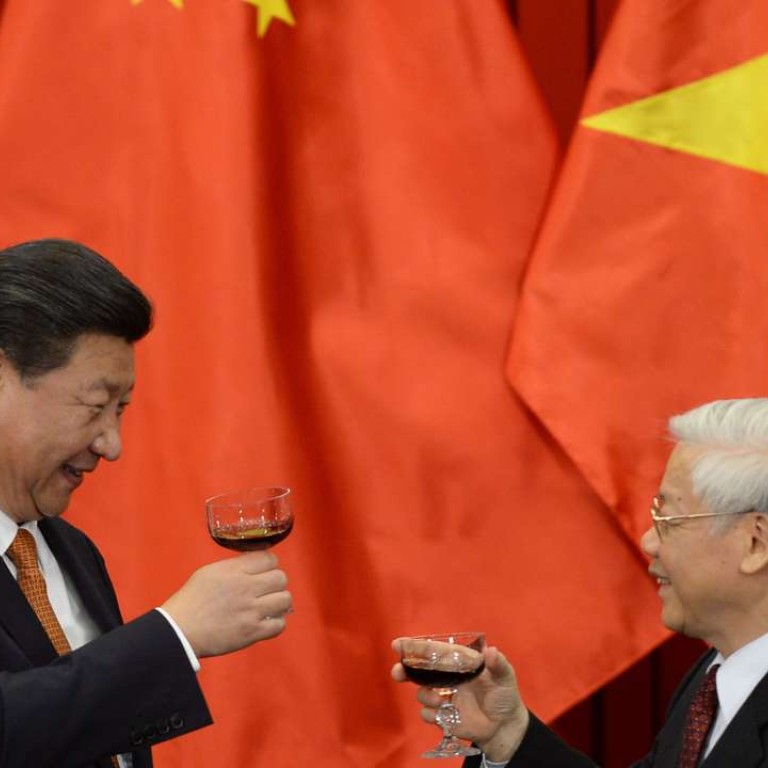
Leaders of communist neighbours China and Vietnam won’t let maritime dispute sour relations
Jiang Xun says the strong relationship between the two countries’ ruling parties has contributed to enduring bilateral relations, and a visit by Vietnam’s party chief to China this week will further strengthen ties
The remarkable resilience of the relationship between China and Vietnam can be credited, in large part, to the strong ties between the communist parties of both countries. The two nations have had military clashes before, and remain locked today in a territorial dispute in the South China Sea. Nonetheless, friendly ties between the Chinese Communist Party and the Communist Party of Vietnam often act as a safety buffer, reining in tempers before any bilateral argument or disagreement gets out of hand.
The question facing Vietnam’s PM on his first China visit: how close to get to Beijing
In 2017, the first foreign leader to visit China will be Vietnamese. Nguyen Phu Trong, general secretary of the Communist Party of Vietnam, will visit Beijing this week at the invitation of Xi Jinping ( 習近平 ), general secretary of the Chinese Communist Party.

Vietnam: Putting the ‘china’ in Indochina
A Vietnamese diplomat based in Beijing said the visit – which comes just ahead of the Lunar New Year, a festival celebrated in both countries – will mark the 67th anniversary of the establishment of diplomatic relations between the two nations. The visit, Trong’s first to China since the successful conclusion of his party’s 12th national congress last year, will be aimed at improving bilateral relations.
In Beijing, the two countries are expected to sign cooperation deals for 18 projects. All preparatory work on 10 of them has been completed, and they are ready to be inked. These include an agreement for cooperation on training party cadres, a memorandum of understanding on the cooperation between the Vietnamese Central Committee’s Commission for Economic Affairs and the Development Research Centre of the Chinese State Council, and a strategic outlook for cooperation between the two countries’ defence ministries.
Other deals are still being negotiated. These include a protocol for China to provide technical support for the building of a coastal railway linking Lào Cai, Hanoi and Haiphong.
How Vietnam has kept China at bay over thousands of years

Mutual interests outweigh our differences, Chinese President Xi Jinping tells visiting Vietnamese PM
Bilateral ties have been improving since 2014, and Trong’s visit is expected to take them to a new level.
Apart from Trong, four other Politburo members are on the 17-strong delegation to China. They are the chairman of the central propaganda department, the foreign minister, the defence minister and the public security minister. Besides, the minister of planning and investment, the minister of agriculture and rural development, the minister of trade and industry, the secretary for the steering committee for bilateral cooperation, and the head of the delegation on border negotiation will also be there.
The impressive line-up of delegates showed that the Vietnamese attach great importance to this visit
A Vietnamese diplomat stationed in China told me that the impressive line-up of delegates showed that the Vietnamese attach great importance to this visit. He said the strategic partnership between the two countries has grown stronger in recent years, especially after the 12th party congress in Vietnam. Both countries must further strengthen their relations, and frequent high-level exchanges would help to enhance mutual trust, he said.
The warming Sino-Vietnamese relationship is reflected in numbers. Last year, Vietnam was China’s largest trading partner among the 10 members of the Association of Southeast Asian Nations. In the first nine months of 2016, China’s registered investments in Vietnam reached a staggering US$1 billion, a year-on-year surge of 300 per cent. And, by October last year, China had injected US$11 billion into 1,500 projects in Vietnam to become its eighth biggest investor.
Further, China has become the largest source of tourists in Vietnam. In 2016, some 2.6 million Chinese visited Vietnam, comprising a quarter of all visitors to Vietnam. Meanwhile, 150 million Vietnamese visited China last year – making Vietnam the No 1 source of visitors to China among Asean countries.
In addition, around 10,000 Vietnamese students are studying in China.
The good, the bad and the ugly of Chinese tourists in Vietnam
Chinese premier urges Vietnam to calm troubled South China Sea waters
For now, their maritime dispute remains the biggest obstacle to better relations. Luckily, both sides agree that until a solution can be found, it would be best to try and minimise their differences. Some Beijing scholars have acknowledged the rise of anti-China nationalism in some quarters in Vietnam, saying there were parallels with attacks on Vietnam’s political system.
We can be sure that on Trong’s visit, the two governments will not allow their maritime row to ruin their cooperation in other areas.
Jiang Xun is deputy editor-in-chief of Yazhou Zhoukan, and editor-in-chief of Zero New Media. This is translated from the Chinese
